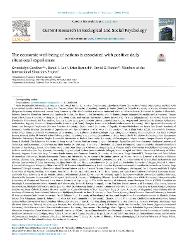| dc.description.abstract | People in economically advantaged nations tend to evaluate their life as more positive overall and report greater well-being than people in less advantaged nations. But how does positivity manifest in the daily life experiences of individuals around the world? The present study asked 15,244 college students from 62 nations, in 42 languages, to describe a situation they experienced the previous day using the Riverside Situational Q-sort (RSQ). Using expert ratings, the overall positivity of each situation was calculated for both nations and individuals. The positivity of the average situation in each nation was strongly related to the economic development of the nation as measured by the Human Development Index (HDI). For individuals’ daily experiences, the economic status of their nation also predicted the positivity of their experience, even more than their family socioeconomic status. Further analyses revealed the specific characteristics of the average situations for higher HDI nations that make their experiences more positive. Higher HDI was associated with situational experiences involving humor, socializing with others, and the potential to express emotions and fantasies. Lower HDI was associated with an increase in the presence of threats, blame, and hostility, as well as situational experiences consisting of family, religion, and money. Despite the increase in a few negative situational characteristics in lower HDI countries, the overall average experience still ranged from neutral to slightly positive, rather than negative, suggesting that greater HDI may not necessarily increase positive experiences but rather decrease negative experiences. The results illustrate how national economic status influences the lives of individuals even within a single instance of daily life, with large and powerful consequences when accumulated across individuals within each nation. © 2023 | en_US |
















